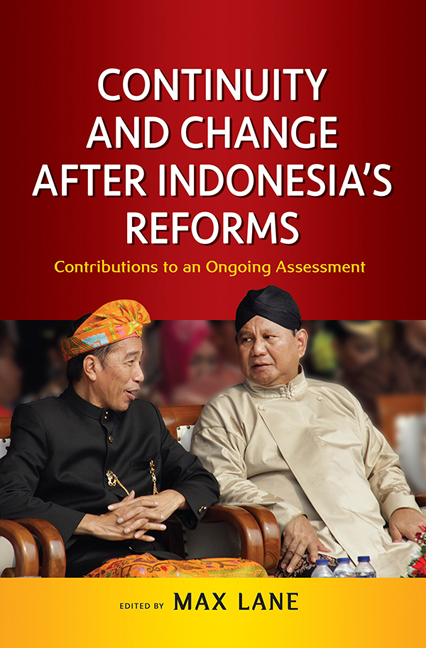Book contents
- Frontmatter
- Contents
- Preface
- About the Contributors
- 1 Indonesia's New Politics: Transaction Without Contestation
- 2 Indonesian Parties Twenty Years On: Personalism and Professionalization amidst Dealignment
- 3 Ideologies of Joko Widodo and Indonesian Political Parties
- 4 Political Islam Movements and Democracy in Indonesia: A Changing Landscape?
- 5 Creating Leadership Legitimacy in Post-Reform Indonesia
- 6 The Political Middle Class in Post-Soeharto Era Indonesia
- 7 The Politics of Centre–Local Relations in Contemporary Indonesia
- 8 The Roots and Actors of Corruption in the Political Realm
- 9 Why Is It Really Hard to Move On? Explaining Indonesia's Limited Foreign Policy Reform After Soeharto
- 10 Papua under the Joko Widodo Presidency
- 11 Youth “Alienation” and New Radical Politics: Shifting Trajectories in Youth Activism
- Index
11 - Youth “Alienation” and New Radical Politics: Shifting Trajectories in Youth Activism
Published online by Cambridge University Press: 06 September 2019
- Frontmatter
- Contents
- Preface
- About the Contributors
- 1 Indonesia's New Politics: Transaction Without Contestation
- 2 Indonesian Parties Twenty Years On: Personalism and Professionalization amidst Dealignment
- 3 Ideologies of Joko Widodo and Indonesian Political Parties
- 4 Political Islam Movements and Democracy in Indonesia: A Changing Landscape?
- 5 Creating Leadership Legitimacy in Post-Reform Indonesia
- 6 The Political Middle Class in Post-Soeharto Era Indonesia
- 7 The Politics of Centre–Local Relations in Contemporary Indonesia
- 8 The Roots and Actors of Corruption in the Political Realm
- 9 Why Is It Really Hard to Move On? Explaining Indonesia's Limited Foreign Policy Reform After Soeharto
- 10 Papua under the Joko Widodo Presidency
- 11 Youth “Alienation” and New Radical Politics: Shifting Trajectories in Youth Activism
- Index
Summary
Introduction
Young Indonesians today have a completely different political experience than previous generations. They were infants, and today's teenagers had yet to be born, when Soeharto resigned on 21 May 1998 amidst massive student protests and popular unrest. They never experienced New Order authoritarianism, and have only vague recollections of the turbulent years of reform (1998–2003) with their sharp political conflicts. They came of age in a post-reformasi climate that is restlessly looking forward, with little memory of the past regime and the struggles that spurred its demise. They have been educated in a neoliberal policy context that grooms them for a role as “quality human resources” — the generation that will realize the nation's technocratic aspirations — with scant encouragement to participate in political life.
And yet, this is also a young generation that is actively seeking social and political change, and that is willing to take action against perceived injustices and deprivation; this includes the deprivation they experience themselves due to the growing inaccessibility and rationalization of higher education and the increasingly insecure labour market that awaits them (Sutopo 2014). How they take action — which channels and methods they use, which issues they take up, and how they frame these issues ideologically — has important implications for the direction of political struggle, considering that political struggles in Indonesia have always been spurred by radical youth activism, and that these struggles remain relevant in the post-reformasi era, in which political and civic rights remain secondary to elite party interests. Will today's young people be able to pose a radical challenge to Indonesia's entrenched politics?
At first glance, there are few signs of such a radical potential. Reports indicate that the majority of young people feel disengaged and alienated from politics (Gnanasagaran 2018). Many former student activists from the 1990s further lament that young people are alienated from the agenda of “total reform” that they initiated in 1998. This agenda for progressive political change has never been fully realized, but few students today seem willing to continue its cause. In post-reformasi Indonesia, young people's political participation seems to be mostly limited to social media activism or “clicktivism” and the ephemeral public actions it occasionally sparks (Lim 2013) — a far cry from the mass mobilizations that young activists engaged in during the 1990s and early 2000s, often joining forces with marginalized social sectors such as factory workers and peasants.
- Type
- Chapter
- Information
- Continuity and Change after Indonesia's ReformsContributions to an Ongoing Assessment, pp. 238 - 262Publisher: ISEAS–Yusof Ishak InstitutePrint publication year: 2019



